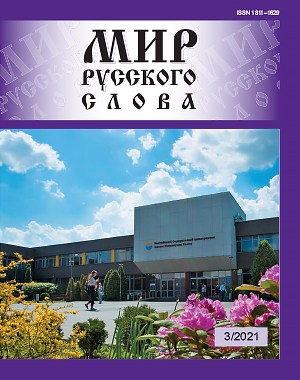“The Linguistic Taste of the Epoch” and its Reflection in the Slang Dictionary: on the Material of the Film Magazine “Eralash”
DOI:
https://doi.org/10.24412/1811-1629-2021-3-42-49Abstract
The article poses the problem of identifying a special group of conversation and slang vocabulary and phraseology, reflecting the “linguistic taste” (or linguistic fashion) of particular epoch, and tests the possibility to create in the dictionary of conversation and slang speech an entry of “epoch’s linguistic taste” category. The purpose of such lexicographical description is to identify and present the dynamics of colloquial and slang vocabulary layer, being rapidly renewed under the influence of the linguistic fashion, and used in everyday communication by a small circle of speakers, usually from younger generation, but understandable by a wide range of native speakers. The “linguistic taste of the epoch” category is defined for conversation and slang vocabulary, with due account of its “chronological markedness”, “common understandability” of the word, as well as the “popularity” of its use among young people and adolescents in a particular epoch. The article proposes the structure of an entry that would reflect dynamics of conversation and slang vocabulary popular in different historical periods; it also attempts to identify and describe the dynamic processes in the vocabulary, popular in the second half of the 20th – early 21st century, based on episodes from “Yeralash” film magazine. The following principles of lexicographical description are laid down: the entries are arranged according to the spheres of communication, where “words-other people”, “words-things”, “words-situations” and “words-relationships” are presented separately. The lexical material within each entry is organized on the basis of the chronological markedness of the vocabulary. Lexical units are presented in an entry section, which corresponds to the particular time. The word of the codified language, which is a dominant of the given synonymic row, is proposed as the entry’s catchword. Vocabulary research based on the material of “Yeralash” film magazine makes it possible to conclude that the units of slang vocabulary in the episodes shot in 1991–2000, i.e. in the time of the most active processes in Russian vocabulary, are much less common than in the 1980s and 2000s. The reason for this phenomenon may be that the vocabulary, felt like slangy in 1991–2000, passed into the category of slang just in 2000–2014, and it allowed the screenwriters to include it into the speech of the children's film magazine characters.
Keywords:
the dictionary of colloquial and slang vocabulary, “the linguistic taste of the epoch”, film magazine “Eralash”
Downloads
References
Словари
References
Dictionary
Downloads
Published
How to Cite
Issue
Section
License
Articles of "The World of Russian Word" are open access distributed under the terms of the License Agreement with Saint Petersburg State University, which permits to the authors unrestricted distribution and self-archiving free of charge.




